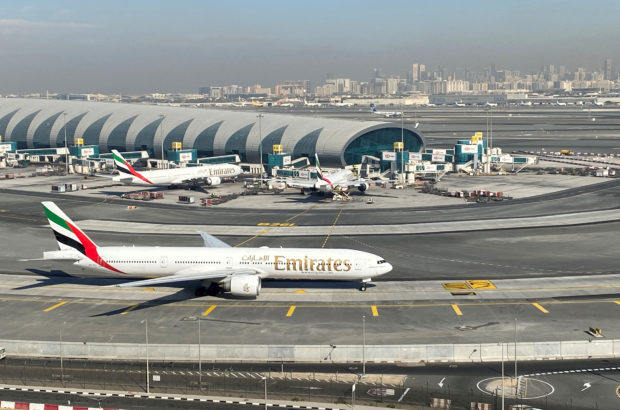
Emirates airliners are seen on the tarmac in a general view of Dubai International Airport in Dubai, United Arab Emirates January 13, 2021. REUTERS FILE PHOTO
DUBAI — Dubai is forging ahead with plans to replace the world’s busiest airport with an even bigger one as passenger traffic recovers to outstrip pre-pandemic levels, a top official told AFP on Wednesday.
Dubai Airports CEO Paul Griffiths said designs were being drawn up for Al Maktoum International Airport, which will be built on the city’s outskirts and should replace Dubai International in the 2030s.
He was speaking at the Dubai Airshow in the United Arab Emirates, where airlines have invested heavily in new planes. Last year, neighbouring Saudi Arabia announced plans for a major new air hub in Riyadh.
“Once we’ve reached about 120 million (passengers a year), which is what we think our total capacity at DXB (Dubai International) is at the absolute maximum with everything optimised, we are going to need a new airport,” Griffiths said.
“That is going to have to happen at some stage during the 2030s. We’re going to be working on those designs over the next few months.
“So the trajectory is good. The confidence in the industry remains high.”
Griffiths was speaking as new figures forecast 86.9 million passengers at Dubai International this year, surpassing 2019 traffic and underlining the recovery from the pandemic.
Third-quarter traffic was 22.9 million, the highest since 2019, taking 2023 numbers so far to 64.5 million, nearly 40 percent higher than the same period in 2022.
‘Little impact’ from Gaza war
Passenger numbers have not been affected by the Israel-Hamas war in Gaza, which is expected to hit regional economies and especially tourism.
There has been “very, very little impact of traffic to the north”, Griffiths said. “In fact, in some regions it’s got even stronger than before, so (there was) no impact that was discernible.”
He added: “We always knew when the pandemic struck, there’d be an equal and strong recovery because people under lockdown for two years were denied the ability to travel. And so that’s why we’ve bounced back so quickly.”
Dubai airport closed briefly to commercial flights from March to July 2020 for the pandemic, but was one of the first travel hubs to reopen. In 2020, it received only 25.9 million passengers, down from 86 million in 2019.
No pricetag or capacity has been set for the new airport, Griffiths said, adding that it would be designed on a modular basis rather than based around terminals — meaning it can easily expand over time.
“It stands to reason that Al Maktoum International has to be even bigger and even better (than Dubai International),” he said, calling it the “airport of the future”.
“This will be a project that extends way into the 2050s, because we take the long-term view here.”
He added: “We are not planning an airport that has terminals. We’re going to completely change the business model for airports, make them actually far more intimate and get rid of all the legacy processes that we’ve had to subject our customers to, for far too long.”